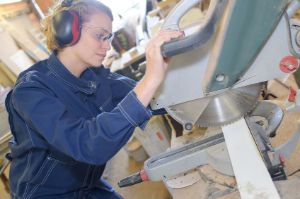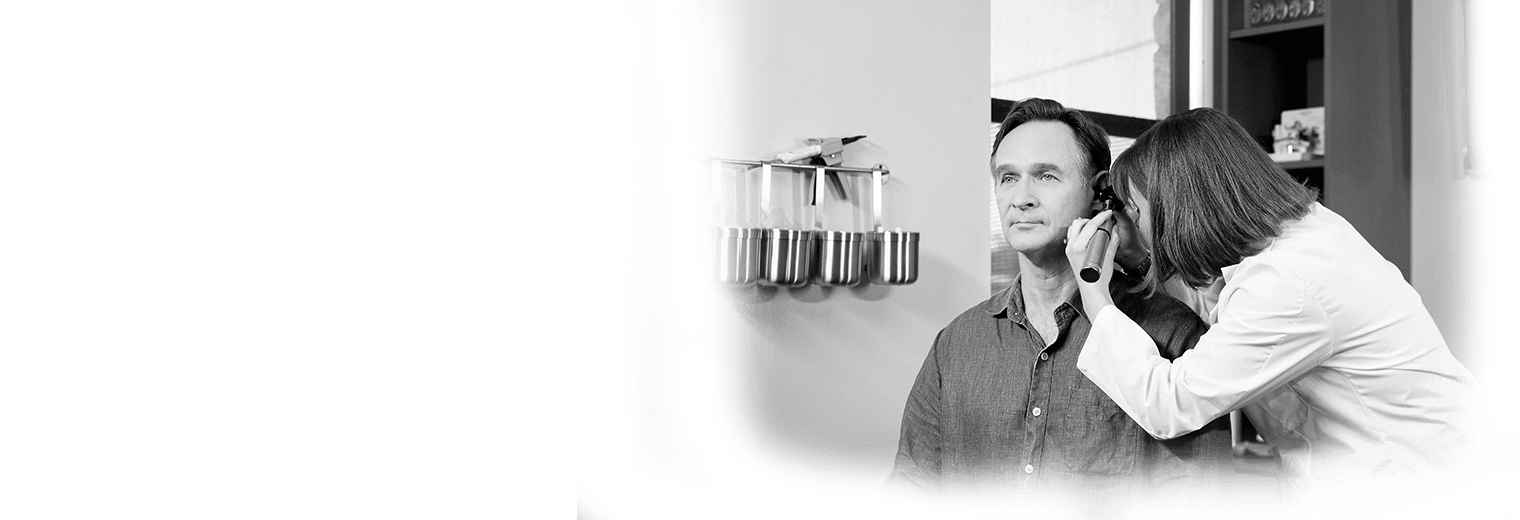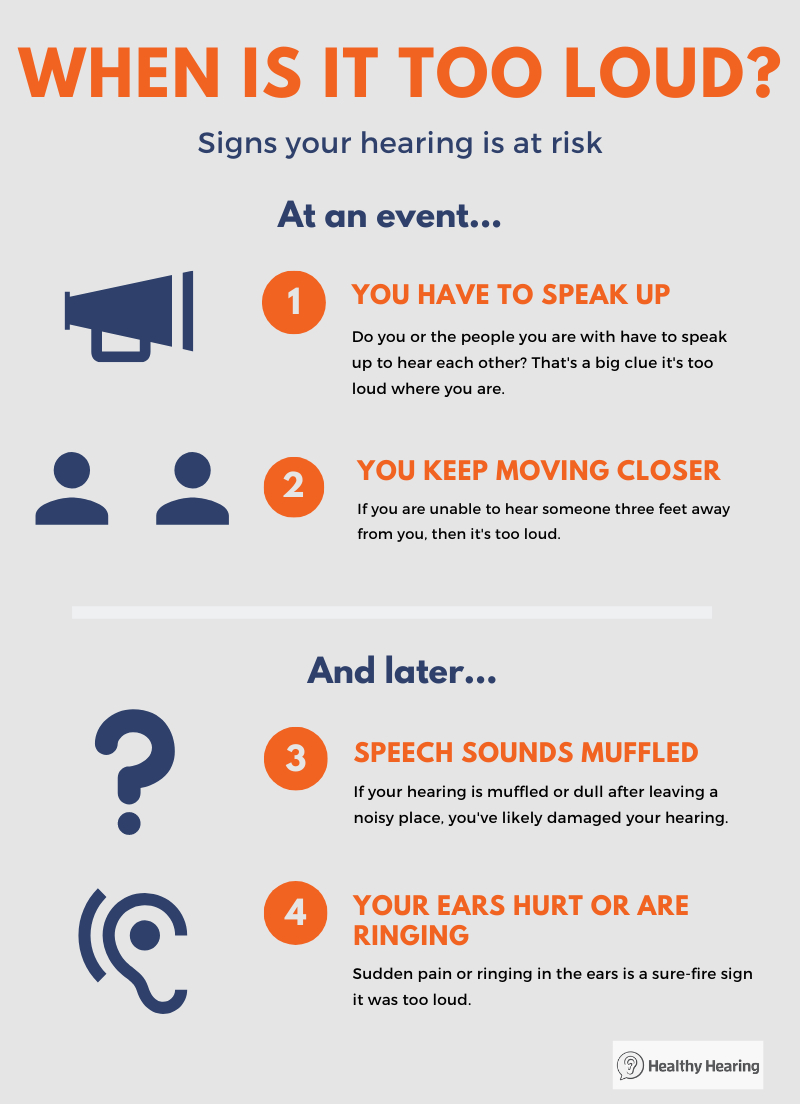|
www.HealthyHearing.com |
Noise-induced hearing loss
By Joy Victory, managing editor, Healthy Hearing  Reviewed by
Megan Gerhart, audiologist Reviewed by
Megan Gerhart, audiologist Last updated on: October 20th, 2025 Our noisy world takes a toll on the delicate structures of the inner ear, sometimes resulting in permanent hearing loss. Key points:
Noise-related hearing loss (NIHL) is one of the most common causes of hearing loss in people of all ages, including teens and young adults. The Centers for Disease Control and Prevention (CDC) notes that "an estimated 12.5% of children and adolescents aged 6–19 years and 17% of adults aged 20–69 years have suffered permanent damage to their hearing from excessive exposure to noise." While noise-induced hearing loss is prevalent, it's also preventable. Let's take a look at why sound can damage your hearing, how loud is too loud, and what you can do to protect your hearing. What is noise-induced hearing loss?In simple terms, noise-induced hearing loss is a type of sensorineural hearing loss that occurs when loud sounds permanently damage the tiny sensory hair cells (stereocilia) in your inner ear. These hair cells are not replaceable and do not regrow. Damaged hair cells are unable to trigger electrical signals to the brain, impacting your hearing. Both intense but short noises—such as a nearby gunshot—and repeated or continuous exposure to loud noises—such as operating construction equipment—can damage the hair cells. 
for example, may cause damage to one ear more than the other. Symptoms of NIHLHearing damage from noise exposure often first shows up as a difficulty hearing high-frequency sounds. This can affect your ability to hear certain speech, especially words with "s," "f," "sh" and "th" sounds in them. (For example, the words "shell" "sell" and "fell" are hard to distinguish.) Many people with this type of hearing loss may feel like they can hear, but can't understand what other people are saying, leading to miscommunications. The degree of hearing loss is usually about the same in each ear. It can range from mild to severe. Other symptoms include:
What noises can cause hearing loss?Contrary to what you might think, it's not just extremely loud noises that can cause permanent hearing loss. Any noise that's over 85 decibels (dB) has the potential to cause hearing loss. The greater intensity of volume, the less time it takes for damage to occur. Many popular hobbies and activities can cause NIHL, including:
Workplace exposure
loud machinery. Occupational hearing loss is one of the most common work-related disabilities, according to the CDC. Data shows that jobs with the highest risk include:
The Occupational Safety and Health Administration (OSHA) requires employers to have hearing conservation programs to limit employees' hazardous noise exposure. These programs include:
Read more about OSHA hearing regulations here. If you are provided hearing protection at your place of employment, be sure to use it to prevent permanent hearing issues. You also may be entitled to workers' compensation benefits for on-the-job hearing loss. More: Hearing loss in the workplace More than just hearing lossAside from damaging your hearing, research shows that noise pollution and NIHL can lead to:
When should you get a hearing test?If you have symptoms of noise-induced hearing loss, or regularly are exposed to loud noise through work or hobbies, it's a good idea to visit a hearing specialist. During the visit you'll be given a hearing test and your results will be charted on an audiogram. If you have NIHL, your audiogram will show a dip to the right, known as a noise-notch pattern. How to prevent noise-induced hearing lossThe good news about noise-induced hearing loss is that it can be prevented, which is why it's so important to take precautions to protect your ears. There are several solutions available for people who anticipate being in loud noise situations, including: Using hearing protectionEarplugs are a common and easily accessible way to protect your ears. Disposable foam earplugs, which are placed in the ear canal, can be purchased at drug, hardware and sporting goods stores. They come in different sizes and lower noise levels by 15 to 30 decibels, which is beneficial in most situations, but not all. Earplugs can also be custom-molded to fit your ears by a hearing healthcare professional, such as musicians earplugs. Earmuffs can be another effective form of hearing protection. They fit completely over the ears and form a seal, and can lower noise levels by 15 to 30 dB. You can pair earmuffs and plugs together for better noise reduction. Turn the music downListening to music through earbuds can put loud sound directly into your ear canal, right at the eardrum. For teens and young adults, listening too loudly or for too long is a leading cause of hearing issues. Be mindful of the volume you're listening at, and avoid using music to block out other unwanted sounds. Replace loud machine partsReplacing machine parts that seem overly loud and using lubricant can reduce friction and lower noise. Many cars, farm equipment and other machinery have mufflers, silencers and bearings that can lessen the sound, which helps keep your ears safe. Be mindful of noise around youOnce you become aware of noise hazards, you will notice them everywhere and can take action. For example, avoid walking directly by active construction sites and cross the street instead. If you're stuck in traffic on a busy highway, roll up your car windows for a quieter ride. Wear inexpensive foam earplugs while mowing the lawn or operating a leaf blower. How do I know if something is too loud?Your can find out via your phone and our list of the best smartphone decibel meter apps to measure sound levels. In general, though, you know it's too loud if you have to lean in close to talk to someone next to you, or shout at them. It's also helpful to know decibel levels of common sounds.
How do you treat noise-induced hearing loss?Typically, the most effective treatment for noise-induced hearing loss is a pair of professionally-fitted hearing aids. Today’s hearing technology is far more advanced than it used to be and designed to fit every budget and lifestyle need. If you’re already noticing signs of hearing loss in yourself or a loved one, don’t wait to get help. Find a licensed hearing care provider near you that will guide you through your options, and get you reconnected with the sounds you love most. Joy Victory, managing editor, Healthy Hearing
You are reading about: Related topics More information about hearing aids, hearing aid brands, assistive devices and tinnitus. Featured clinics near me
Earzlink Hearing Care - Reynoldsburg Find a clinicWe have more hearing clinic reviews than any other site! Related contentThe Healthy Hearing Report |
|
www.HealthyHearing.com |
Noise-induced hearing loss
By Joy Victory, managing editor, Healthy Hearing  Reviewed by
Megan Gerhart, audiologist Reviewed by
Megan Gerhart, audiologist Last updated on: October 20th, 2025 Our noisy world takes a toll on the delicate structures of the inner ear, sometimes resulting in permanent hearing loss. |




 Joy Victory has extensive experience editing consumer health information. Her training in particular has focused on how to best communicate evidence-based medical guidelines and clinical trial results to the public. She strives to make health content accurate, accessible and engaging to the public.
Joy Victory has extensive experience editing consumer health information. Her training in particular has focused on how to best communicate evidence-based medical guidelines and clinical trial results to the public. She strives to make health content accurate, accessible and engaging to the public.